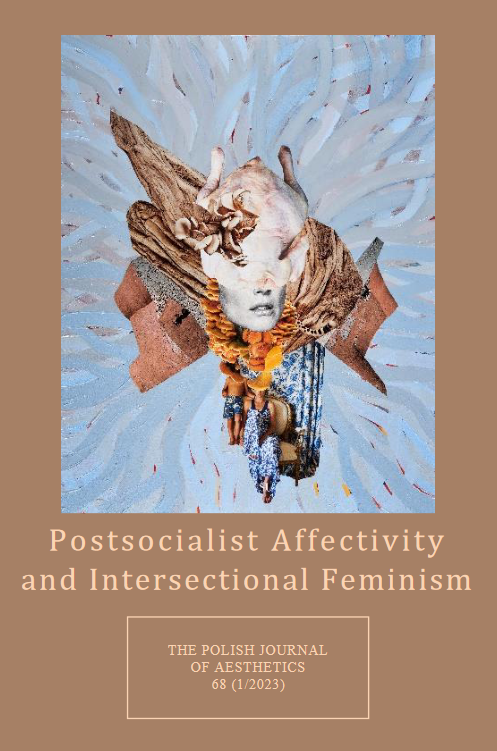Numer 68 (1/2023)
Postsocialist Affectivity and Intersectional Feminism|
Spis treści
Strony
Pobierz
|
|||||
|
|
|||||
|
INFORMACJE O AUTORACH Natalia Anna Michna Uniwersytet Jagielloński w Krakowie Jana Kukaine Uniwersytet Stradiņša w Rydze (Rīgas Stradiņa universitāte), Łotwa |
|||||
|
Teresa Fazan
“Our Indignation Drives Me.” The Biopolitics of Abortion and Counterpublic in Poland
DOI: 10.19205/68.23.1
11 – 34
|
|||||
|
Słowa kluczowe Abortion |biopolitics |Counterpublic |Postsocialism |Reproductive Rights |Social MovementsStreszczenie This paper approaches the Women’s Strike (2020-2021) from the participants’ perspective. First, the author outlines the political and cultural context, emphasizing the contemporary debate about abortion in Poland. Then, the analysis of the protests, conducted in line with Butler, Czarnacka, Graff, Korolczuk, and Majewska, is combined with the author’s research outcomes based on the multi-sited participant observation and semi-structured qualitative interviews with participants of the protests. The main argument is that reevaluating the outcomes of a social movement that did not achieve its goal necessitates expanding the meaning of social change beyond the completion of said goal. INFORMACJE O AUTORZE
Uniwersytet Warszawski
|
|||||
|
Anne Sauka
Breaching the Dialectic with Situated Knowledges: The Case of Postsocialist Naturecultures
DOI: 10.19205/68.23.2
35 – 56
|
|||||
|
Słowa kluczowe Ontogenealogy |Postsocialist Embodiment |Situated Knowledges |Genealogy |EnvironmentStreszczenie The article analyzes the significance of situated knowledges for going beyond dominating conceptual dichotomies that a) establish status quo dialectics, b) proliferate homogenization of the Global Northern experienced materialities, and c) conceal and suppress alternate affectual body-environment experiences and materializations. With the example of postsocialist ontogenealogies, the article analyzes the potential blind spots when failing to consider both sides of a status quo dialectic in their interconnectedness. To conclude, the article suggests the potential of situated knowledges as a vehicle for future environ-mental ethicalities. INFORMACJE O AUTORZE
Uniwersytet Łotewski
|
|||||
|
Jana Kukaine,
Jānis Taurens Forgetful and Drowsy: The Affective Atmospheres in Contemporary Latvian Photography
DOI: 10.19205/68.23.3
57 – 74
|
|||||
|
Słowa kluczowe Postsocialism |Affective Atmosphere |Latvian Contemporary Photography |Forgetting |SleepingStreszczenie In the article, we advance the notion of an affective atmosphere for analyzing the works of art by two contemporary Latvian photographers—Aija Bley (b. 1967) and Arnis Balčus (b. 1978). The spatial relations of bodies and environments and the photographed subjects’ facial expressions and postures negotiate a sense of postsocialist affectivity that we describe as forgetful and drowsy. In the selected images, the affective atmospheres enact the ambiguities of the Soviet legacies, along with the challenges of neoliberal rationality affecting today’s Latvian society. INFORMACJE O AUTORACH Jana Kukaine Uniwersytet Stradiņša w Rydze (Rīgas Stradiņa universitāte), Łotwa Jānis Taurens Uniwersytet Stradiņša w Rydze (Rīgas Stradiņa universitāte), Łotwa |
|||||
|
Raili Marling
Feeling Historical: Postsocialist Affect in Estonian Fiction
DOI: 10.19205/68.23.4
75 – 87
|
|||||
|
Słowa kluczowe affect |Estonia |Postsocialism |Neoliberalism |fictionStreszczenie In this article, building on the work of Lauren Berlant (2008, 2022) and Sara Ahmed (2004, 2010), I ask what it means to feel historical in the context of today’s pervasive crisis ordinariness, whether it is possible to talk about a particular postsocialist affect, and what aesthetic forms the affect takes in fiction. The analysis of two Estonian texts will follow the theoretical discussion: Tõnu Õnnepalu’s novel Border State (1993) and Maarja Kangro’s story collection Õismäe ajamasin (2021). INFORMACJE O AUTORZE
Uniwersytet w Tartu, Estonia
|
|||||
|
|
|||||
|
Słowa kluczowe War Photography |Epistemic Injustice |Somaesthetics |critical fabulation |Listening to ImagesStreszczenie This paper analyzes the role of the viewers of photographs of violence. The main argument is that due to the characteristic of the medium, both the photographer and the photographed subjects shape the image. The customary overlooking of the photographed subjects’ agency is conceptualized as epistemic injustice first committed by the photographer and then by the viewer. A method of interpreting war photographs influenced by critical fabulation and listening to images is proposed to overcome it. INFORMACJE O AUTORZE
Uniwersytet Warszawski
|
|||||
|
|
|||||

